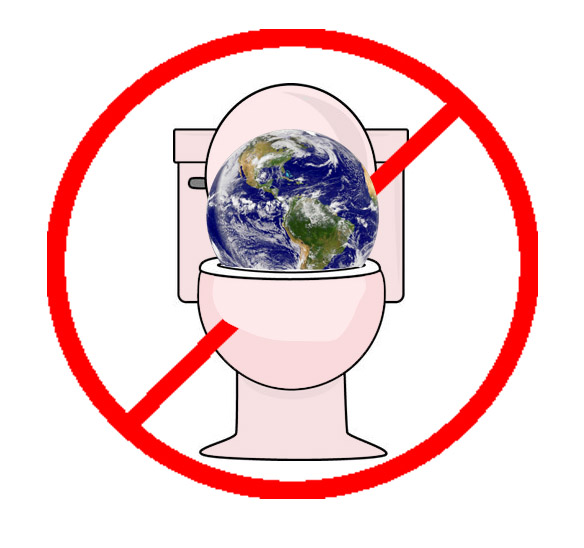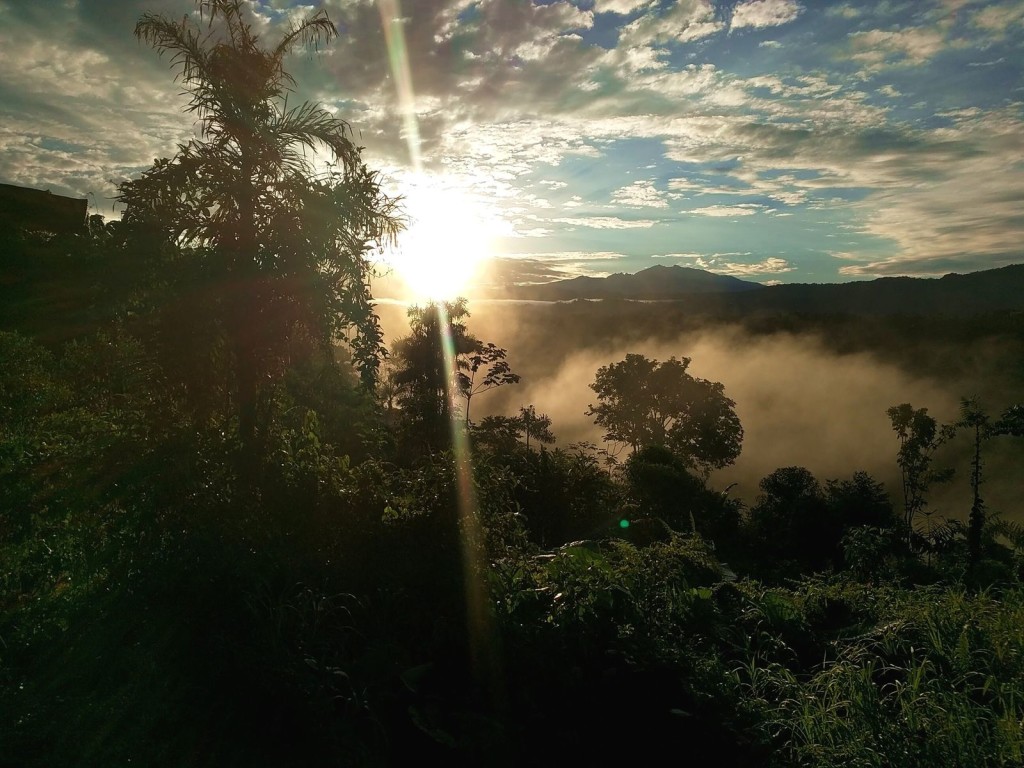An Interview with Mother Earth on Climate Change


Mother Earth shows off a little, the Equator, October 2015
For the past three years, I've had the privilege of making an annual trip to the equator of our planet, spending a week or two absorbing the very different world of South America. One of the unexpected benefits is that I get to converse occasionally with Mother Earth herself.
Of course, we all know her to a certain degree, since She made us from scratch and provides for all of our needs for every second of our lives. But She actually keeps Her eyes and ears down there, probably because that is where the greatest concentration of living things hang out. The Sun is at its most intense, and there is more biodiversity in a single square kilometer of Amazon rainforest than you'll find in the entire United States.
So anyway, I ran into Her during a late-night walk through the jungles of Ecuador, and I was pleased that She granted me an interview. With the secret environmental mission of this blog in mind, I decided to focus most of my questions on climate change (global warming), since that is probably the biggest risk we'll face over the next few generations. The transcript below recounts our conversation.
--
Mother Earth Speaks up on Climate Change
Mr. Money Mustache: Thanks a lot for the interview, and thanks for everything you do. Your fine bounty is really what makes life worth living, for all of us.
Mother Earth: No problem, and thanks for caring. Since all living things are really just rearrangements of my own atoms, you are all my children, and thus my own reason for living as well.
MMM: So, how do you feel about all the damage we humans have been inflicting upon you in recent centuries? Are we at risk of destroying you?
Earth: (chuckles) Goodness, no! I'm far too big to ever be destroyed, short of being thrown into the Sun. But what you humans do risk, is destroying your own bountiful way of life.
Right now, your prosperity is provided by a plentiful supply of clean air, water, food, and energy. Although some of you like to take all the credit for this, it's really my ecosystem that does all the hard work: the plants, animals, oceans, air currents, and especially the atmosphere. Without these services, you would lose your ability to create the food and products that form your current prosperity.
And due to your volatile, pissypants nature at times, even a slight drop in resource availability tends to cause major fighting, wars, and dictatorships.
I will be fine either way. And life will always find a way to flourish on my surface. Even some humans will probably continue to exist, since some of you are so damn clever. The question is simply how many billions of you will die in the great adjustment if you mess up the free ride you're getting right now?
MMM: Sure, that makes sense. But pollution levels have been dropping in the richest countries as we enact better controls and technology. Won't we eventually clean up our act?
Earth: Pollution is one thing: soot, chemicals, agricultural runoff in streams, radioactive materials. But these things wash away quickly as soon as you stop dumping them onto my surface. So yes, pollution controls have a quick effect on human wellbeing.
But what you're missing is carbon. As in the surplus of carbon dioxide you're pumping out through coal power plants, farms, chopping down billions of trees, and all your gas-burning machines. This has the potential to warm shit up around here, with bad results for you. By my odds, you're already more than half way to emitting enough carbon dioxide to create that serious multi-billion-person disaster. But because it's an exponential game, you're within just a decade or two of reaching the end of it.
MMM: Carbon dioxide? But isn't that a natural part of the environment? We all exhale it, plants inhale it, oceans absorb it, volcanoes belch it, and the concentrations have varied greatly throughout the history of the planet. And your climate has warmed and cooled many times in the past: during your Snowball phase about 650 million years ago, your entire surface, including the oceans and right down to the Equator, was frozen. At other times, there was subtropical vegetation on Antarctica. The first human inhabitation of North America itself was made possible by an ice bridge from Asia, which melted at the end of the recent ice age. Isn't change just part of the program around here?
Earth: Well, you got part of it right: Carbon dioxide controls the climate. The difference is how quickly you have cranked it up in the last blink of an eye. In the past, change happened over many thousands or millions of years. Even then, it was catastrophic to many species, killing out some, relocating others, and expanding those who were tough enough to survive and adapt.
In this case, you've gone apeshit overnight and are still cranking up the speed. This means a lightning-fast rise in temperature when you think in my time scale - faster than many plants and animals can adapt to. That will take a chunk out of your ecosystem, and remember that the ecosystem is the basis for your nice way of life. Without it, you're no longer rich. The Ecosystem is the Economy.
MMM: OK, so there is that. But maybe we can use our rapidly advancing technology to compensate. And the temperature thing couldn't be that bad either, right? I live in Colorado, and a few extra degrees would be nice in the winter so I could plant some Avocado trees in my back yard. In fact, most of your land mass is in the North and fairly far from the equator, such that we might even end up with more productive land if the climate warmed. Canada and Russia are still mostly empty in their Northern reaches.
And what do you say about the naysayers who deny that global warming even exists, generally speaking up every time a bout of unusually cold weather strikes?
Earth: You sound like an oil executive right now. But let's get things straight: first of all, we call it climate change because the changes are unpredictable and happen in various ways. On average, I am getting warmer. Fast. This means there is more energy in store, which lifts more water vapor from the ocean and pushes it around with stronger winds. Bigger storms, more intense snowfalls and rainfalls, more severe droughts, and just more surprises in general.
As for the warming of previously-frozen areas: this is true: you'll get more farmland up there in the North. But more farmable land will probably mean even more natural ecosystems being chopped down. Meanwhile, you will also lose a lot of your best stuff down South as it becomes too hot or dry for farming.
And even more importantly, you'll lose your current coastlines, where the most valuable cities are. Because even a tiny warming of the poles will melt enough ice to raise the entire sea by several feet. There's enough ice on Greenland alone to raise all the oceans 20 feet. And guess what's happening to Greenland right now? If you melt even a fraction of my big ice reserves, you will flood out billions of people, which will cause you great expense, famine, and fighting.
MMM: Funny you should mention more intense storms. Two years ago, my city of Longmont, Colorado received 12 inches of rain in a single storm. That's about the amount of rain we normally get in an entire year. This caused the creek that runs through the town to swell into a giant brown river that swept away several people, washed away bridges and flooded a few hundred houses and businesses. This was a 500-year flood, which means it has never happened since any buildings larger than the teepees of the Native Americans were around. Maybe never at all - nobody knows.
It's costing us about $175 million to rebuild from that one rainstorm alone, which is roughly $2000 per person, for every person in the city including the babies. I can't help but wonder what other, better uses we could have put such a huge sum of money to use for. On a worldwide basis, storm damage is increasing rapidly and the cost is in the trillions.
Earth: You got it. Events like hurricane Katrina, Sandy, and your flood will all become much more common as the climate warms. It takes energy to move all that water around, and you're just storing more energy when you trap heat with the greenhouse effect of carbon dioxide. And the fancier your cities and houses are, the more expensive it gets when big storms wipe them out.
I can't help but notice that your greater Miami area, one of the most expensive chunks of seaside infrastructure ever built by humans, sits right at sea level and could be completely underwater within a generation based on current ocean rise.
MMM: Shit.. maybe we had better try to slow down the climate change after all. But we're more or less addicted to fossil fuels, as they do all the work for us. If we reduce their use, we slow our own economy. What can we do?
Earth: Nonsense! You're talking in that Exxon voice again. There is enough energy in the sunlight that strikes my surface in an hour, to power your whole seven billion person belching smokestack of a world economy for more than a year. Of course you can't harvest it all, or even one hundredth of it. But this is about a nine thousand-to-one safety margin, before you even get into any other source of power.
MMM: All right, let me go and run the numbers on this. Maybe there is a way that modern, smartphone-loving, jet-aircraft-flying humans can still achieve peace with our own planet while still maintaining a booming, high-tech economy, bring more prosperity and happier lives to the billion or more people still in deep poverty, and still be able to have just as much fun as we do right now.
Preview: this won't be hard, as I can't help but run these numbers all the time. I have them tattoed on my back and written in crazy man lipstick on my bathroom mirror. So tune in for the next article where we'll cover how to combine even more wealth with an almost-instantaneous stop to overheating the planet.